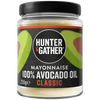You say cocoa, we say cacao! Here is what you need to know when it comes to distinguishing between these two very different ingredients.
What is the difference between low cadmium cacao versus cocoa powder? 🧐
First things first, let’s look at the difference between cacao and cocoa, because as you might suspect - they're not both created equal!
They are end products which come from the same tree and the same raw bean (Theobroma cacao).
However, they are each processed differently, leading to different flavour profiles and even nutritional benefits.
Cacao vs. Cocoa 🍫
What is cacao?
Cacao is what we call the raw bean derived from the cacao tree. Typically it is harvested, fermented, dried, crushed and ground.
As the beans are not roasted or alkalised but fermented instead, antioxidant-rich polyphenols and minerals found in the plant mostly remain in the cacao beans.
The fermentation process helps to reduce levels of anti-nutrients such as oxalates. To make the substance into a powder, it is cold pressed to remove the fat, known as cocoa butter (roughly 50% of the original composition).
Within the food industry, “raw cacao” typically refers to the most unprocessed and additive-free form of the main ingredient that is used to make chocolate.
What is cocoa?
Meanwhile, cocoa is made by roasting these same cacao beans at higher temperatures and treating them with an alkaline substance which makes the flavour less acidic.
Whilst it may end up with a sweeter flavour compared to cacao, the processing of cocoa means that the molecular structure of the beans change, which impacts the polyphenol and mineral profile - ultimately lowering the nutritional value.
Cocoa is most widely used in the big food industry for making chocolate. For this reason, many cocoa powders also contain additives like sugar because they are processed for their flavour and addictive properties - in comparison to their health benefits, as with cacao.
What are the health benefits of cacao? 💪
Evidence suggests that cacao may have various health benefits, such as improving heart health, reducing inflammation, and providing a source of magnesium - which is a cofactor for more than 300 enzymatic reactions, and crucial for cellular energy (ATP) metabolism.
These health benefits associated with cacao and cocoa consumption are mainly attributed to their antioxidant content, particularly from the flavonoids, but cacao also contains minerals such as iron, magnesium, phosphorus, zinc, manganese, and copper.
It’s important to note that roasted and alkalised cocoa may still have some nutritional benefits, in terms of mineral levels and some antioxidant properties.
However, the specific health advantages of cocoa vary widely depending on things such as where it is sourced, how it is processed and much more.
So where does cadmium come in then? 🤔
Cacao and cocoa products, including chocolate, can often contain high levels of cadmium and other heavy metals typically due to soil contamination where they are grown.
Cacao trees have a high affinity for absorption. This means that when they are grown in soil with high levels of cadmium and other heavy metals - often typically occurring in the soil - the metal can be absorbed by the plant's roots and eventually end up in the cacao beans.
It is normal for some level of heavy metals to be found in plants based on absorption from the soil, but anything beyond very low levels is not fit for consumption - as cadmium is after all a heavy metal which can have several harmful effects.
Potential Dangers of High Cadmium Foods
In acute exposure cadmium can cause vomiting, stomach issues and diarrhoea. Due to its reactivity as a heavy metal, prolonged exposure can lead to cadmium deposits in the body that may cause kidney damage, weak bones and even cancer.
So it may be surprising to learn that most of the dark chocolate on the market may contain harmful levels of heavy metals, according to a Consumer Reports study published in December 2022.
And whilst dark chocolate would always strike you as the healthier option (rightly so), the darker the chocolate, the higher the maximum levels of heavy metals due to the higher level of cocoa / cacao.
What else affects cadmium levels?
Soil contamination can also be exacerbated by industrial activities, mining and pollution, which release heavy metals into the environment.
From a geographical perspective, some areas have naturally higher levels of cadmium in the soil, which can be absorbed by the cacao trees.
Additionally, the use of certain agricultural practices, such as the application of cadmium-containing fertilisers, can increase cadmium levels in the soil and, consequently, in cacao products too.
Hunter & Gather Collagen Creamer made with Low Cadmium Cacao 🥄
For all of the above reasons, we have been purposefully selective in sourcing the cacao powder used in our Cacao Collagen Creamer.
This includes ensuring that it has been through rigorous testing and quality control measures, to ensure that it is low in cadmium content based on EU regulations.
We want to make you aware of this as we feel it is important that our customers are making informed choices when it comes to the quality and safety of consumable products.
So you can enjoy every delicious sip of our Collagen Creamer knowing that it is as good for you as it tastes, with low and safe cadmium levels.

All information provided on our website and within our articles is simply information, opinion, anecdotal thoughts and experiences to provide you with the tools to thrive.
It is not intended to treat or diagnose symptoms and is definitely not intended to be misconstrued for medical advice. We always advise you seek the advice of a trained professional when implementing any changes to your lifestyle and dietary habits.
We do however recommend seeking the services of a trained professional who questions the conventional wisdom to enable you to become the best version of yourself.











